|
|
|
Sort Order |
|
|
|
Items / Page
|
|
|
|
|
|
|
| Srl | Item |
| 1 |
ID:
138683


|
|
|
| 2 |
ID:
177085


|
|
|
|
|
| Summary/Abstract |
Since April 2019, Japan has recognized manual labor as a “specified skill” in new immigration policy. According to OECD statistics on the annual inflow of foreign population by country, Japan ranks fourth among OECD member states. In fact, Japan is a major immigrant destination, with 2.84 million foreign nationals living within its borders. Internationally, the level of happiness among immigrants is considered an important issue, and indeed the World Happiness Report has published a special feature on the topic. However, in Japan, no such surveys have been conducted, with the exception of studies on happiness among international students. The current study examines the level of happiness among immigrants to Japan and was conducted using micro data from the Foreign Nationals’ Opinion Survey conducted by City “T” in Japan. These data were used because no nationwide surveys of happiness among foreign residents in Japan have been conducted. Results of the regression analysis indicated that the ability to speak Japanese had a significantly positive effect on the level of happiness. They also indicate that those who had experienced the negative aspects of life in Japan—such as working for companies that violate labor laws (e.g., not paying overtime) and who had an unpleasant experience in their daily lives—had a low level of happiness. These results suggest the possibility that the image foreign nationals have of Japanese society may worsen, which in turn would lower their level of happiness and lead to their separation from Japanese society. Japan’s immigration policy thus requires an examination of happiness.
|
|
|
|
|
|
|
|
|
|
|
|
|
|
|
|
| 3 |
ID:
139709
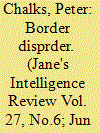

|
|
|
| 4 |
ID:
158078


|
|
|
|
|
| Summary/Abstract |
In mainstream scholarship, David Ben-Gurion is described as one of the main supporters and primary advocates of the policy of encouraging mass Jewish immigration to Israel (aliya) in the 1950s. The Zionist movement had two different motives for supporting aliya: Diaspora Jews’ need for a safe haven (which would require mass aliya), and the need to build a solid and stable Jewish society in mandatory Palestine/Israel (which would require selective aliya).
|
|
|
|
|
|
|
|
|
|
|
|
|
|
|
|
| 5 |
ID:
165548


|
|
|
|
|
| Summary/Abstract |
Today, in all European countries, it is possible to identify a framework of policies addressing immigrants’ integration. By considering the various areas of policies concerned with such a phenomenon, the present study identifies the existence of shared patterns of responses across countries. I do so by introducing the concept of configuration of integration policies (CIP) and relying on a hierarchical cluster analysis. The analysis identifies two main shared-configurations for dealing with immigrant integration cutting across the East/West cleavage, with the Eastern configuration more restrictive than the Western one, especially in the areas of labor, education, political participation, and citizenship; they are, instead, closer to each other as they pertain to family, residence, and antidiscrimination; namely, in policy areas concerned with salient human rights issues and targeted by European directives. This evidence speaks to the broad debate in the field of immigrant integration policies, paving the way for further research and theoretical speculation.
|
|
|
|
|
|
|
|
|
|
|
|
|
|
|
|
| 6 |
ID:
051544


|
|
|
| 7 |
ID:
099836


|
|
|
|
|
| Publication |
2010.
|
| Summary/Abstract |
Countries of immigration are generally faced with a dilemma: they wish to accept immigrants for economic purposes, but also to restrict immigration for ethnonational reasons. This is especially true in ethnic nation-states, where immigration is seen as a threat to ethnonational unity more than in civic nation-states. However, in recent decades, various ethnic nation-states have adopted immigration policies that have encouraged their diasporic descendants born and raised abroad to return to their ethnic homeland. Ethnic return migration apparently solves the immigration dilemma by providing ethnic nation-states with a much-needed unskilled labour force without causing ethnonational disruption because the immigrants are co-ethnic descendants. After comparing ethnic return migration policies in European and East Asian countries, this article analyses the development of such policies in Japan and their eventual failure to solve the country's immigration dilemma. As a result, Japan (and other ethnic nation-states) have imposed restrictions on ethnic return migration.
|
|
|
|
|
|
|
|
|
|
|
|
|
|
|
|
| 8 |
ID:
110963
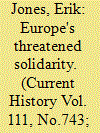

|
|
|
|
|
| Publication |
2012.
|
| Summary/Abstract |
Left unchecked, the current crisis could reshape almost everything from money and finance to security and defense, and from welfare state institutions to immigration policy.
|
|
|
|
|
|
|
|
|
|
|
|
|
|
|
|
| 9 |
ID:
138935
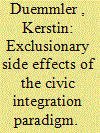

|
|
|
|
|
| Summary/Abstract |
Civic integration policies have become common in many European states and require that immigrants commit to integrating into the host society. This article draws on a study with young people in Swiss schools and investigates how these new political debates around civic integration find resonance in everyday narratives about immigration. The boundary approach is used as a framework to study the daily (re)production of the ‘Swiss–foreigner divide’. It reveals that assimilation into ‘Swiss culture’ (e.g. speak the local language and conform to social norms) remains a criterion defining who can become a legitimate member of Swiss society. Nonetheless, integration deficits are often perceived as the rule and transformed into a stigma so that ‘foreigners’ are frequently not recognised as legitimate members of society. This study indicates how the Swiss youth in this study legitimise and (re)produce exclusion and how this exclusion is embedded within past and current Swiss immigration policies.
|
|
|
|
|
|
|
|
|
|
|
|
|
|
|
|
| 10 |
ID:
119491


|
|
|
|
|
| Publication |
2013.
|
| Summary/Abstract |
Nicolas Sarkozy's presidency presented a mixed record on the issues of Muslim immigration and integration. On the one hand, his administration took novel and constructive steps to advance the integration of Muslim immigrants into French society, notably through the granting of unprecedented official recognition and institutional representation to Islam in the country. On the other, by placing the immigration issue at the centre of his 2012 re-election strategy, he overshadowed and undermined the effectiveness of these integrative policies. Given the country's worsening economic outlook and rising unemployment, immigration is therefore likely to remain as salient and difficult an issue under the new Hollande administration as it was under Sarkozy's.
|
|
|
|
|
|
|
|
|
|
|
|
|
|
|
|
| 11 |
ID:
093789
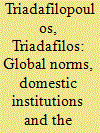

|
|
|
|
|
| Publication |
2010.
|
| Summary/Abstract |
This article examines the liberalisation of immigration policy in Canada and the US in the post-World War II era. I argue that shifting norms pertaining to race, ethnicity, and human rights cast longstanding discriminatory policies in Canada and the US in a highly critical light. Opponents of racially discriminatory immigration policies exploited this shift in normative contexts to highlight the disjuncture between Canada and the US' postwar commitments to liberal norms and human rights, on the one hand, and their extant policy regimes, on the other. The resulting pressure set in motion comparable processes of policy stretching and unravelling, which culminated in policy shifting in the mid-1960s. Policy shifting was, however, subject to very different political dynamics. Whereas Canada's institutional configuration granted the executive branch and bureaucracy a high degree of autonomy that enabled experimentation, the greater openness of the American political system led to a more politicised process, marked by compromises and deal-making. Thus while changing norms prompted the liberalisation of immigration policies in both countries, differences in their domestic political contexts resulted in very different admissions regimes.
|
|
|
|
|
|
|
|
|
|
|
|
|
|
|
|
| 12 |
ID:
161592


|
|
|
|
|
| Summary/Abstract |
The notion of dark networks has recently received attention in the literature on policy network analysis. Dark networks are defined as illegal and covert, in contrast to bright networks which are legal and overt. In this article, we suggest a third category – grey networks – which are characterised by their use of secrecy and concealment despite their ostensibly legal status. These networks are subject to contradictory imperatives. They employ methods that cannot be openly acknowledged within the larger legal and social framework in which they function. In this article, we illustrate this concept through an interview‐based study of Australia's immigration detention network. This network enacts a deterrence policy which has been widely condemned as breaching Australia's obligations under international law. At the same time, it is required to maintain a façade of lawfulness and respect for human rights.
|
|
|
|
|
|
|
|
|
|
|
|
|
|
|
|
| 13 |
ID:
174050


|
|
|
|
|
| Summary/Abstract |
This article assesses an assumption pervasive in one strain of arguments in favor of stringent immigration controls. The assumption affirms that—for the case of regular admissions—to a certain extent states are permitted to prioritize the interests of their citizens and residents by issuing exclusionary immigration policies (call this the priority assumption). Using the normative methodology of applied international ethics, I suggest some broad constraints to this priority assumption that have a bearing on justifications for current practical immigration policy in Europe, North America, and beyond. I do so by redefining borders as domestic-international institutions that open up borders not only to (internal) standards of justice but also to standards of international legitimacy.
|
|
|
|
|
|
|
|
|
|
|
|
|
|
|
|
| 14 |
ID:
177892


|
|
|
|
|
| Summary/Abstract |
The state interferes with the intimate spheres of families and couples via family migration policies, which have grown increasingly restrictive in many European countries. Mixed-status couples engaging in spousal migration develop coping strategies in order to adapt to hurdles and overcome them. This article explores the under-researched perspectives of sponsor spouses on (family) migration policies. When interacting with authorities, politicians or counselling services, the sponsors often react discursively, using arguments relating to human rights, citizenship, membership as well as gender and marriage/family norms. Based on a qualitative analysis of case dossiers of a German NGO counselling mixed-status couples, the article explores the narratives and strategies developed by the (mostly White) German citizen sponsors, thereby analysing the ways they ‘perform citizenship’ at the crossroads of migration control, marriage and family norms, and membership.
|
|
|
|
|
|
|
|
|
|
|
|
|
|
|
|
| 15 |
ID:
130671
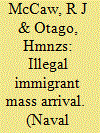

|
|
|
| 16 |
ID:
108673
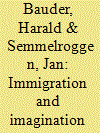

|
|
|
|
|
| Publication |
2009.
|
| Summary/Abstract |
Immigration policy and debate can reveal how a nation imagines itself. This study examines the dialectic between immigration and German nationhood in the context of the parliamentary debates between 2002 and 2006. Contents and discourse analyses of transcripts of the Bundestag were supplemented with interviews with policymakers. Our interpretation of the data reveals two distinct narratives: that Muslim immigration is a threat to the democratic order of the German state; and that immigration constitutes a utility serving economical and social objectives. European Union regulations, party politics, and the nature of parliamentary speech also play a role in framing parliamentary discourse of immigration and nationhood.
|
|
|
|
|
|
|
|
|
|
|
|
|
|
|
|
| 17 |
ID:
178018


|
|
|
|
|
| Summary/Abstract |
Though populist politicians deem the terrorist threat as a reason for restrictive immigration policies, existing studies neglect to explore the systematic connection between immigration and security. This study offers a novel theoretical argument about the effect of terrorism on immigration policy and then conducts a first-cut empirical analysis. Based on a battery of statistical tests performed against pooled panel data on immigrant-receiving countries that are attractive to low-skilled workers due to high wages, this study shows evidence that terrorist threats are actually unrelated to restrictive immigration policies.
|
|
|
|
|
|
|
|
|
|
|
|
|
|
|
|
| 18 |
ID:
128183
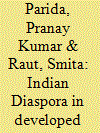

|
|
|
|
|
| Publication |
2014.
|
| Summary/Abstract |
The Indian Diaspora is a genetic term to describe the people who migrated from territories that are currently within the border of the Republic of India. It also refers to their descendants. The Diaspora is currently estimated to number over twenty million composed of NRI-Indian citizens not residing in India and PIO-persons of Indian Origin who have acquired the citizenship of some of other country. The Diaspora covers practically every part of the world.
|
|
|
|
|
|
|
|
|
|
|
|
|
|
|
|
| 19 |
ID:
060546


|
|
|
|
|
| Publication |
Gurgaon, Hope India Publications, 2003.
|
| Description |
240p.hbk
|
| Standard Number |
8178710000
|
|
|
|
|
|
|
|
|
|
|
|
Copies: C:1/I:0,R:0,Q:0
Circulation
| Accession# | Call# | Current Location | Status | Policy | Location |
| 049476 | 954.004914/SIN 049476 | Main | On Shelf | General | |
|
|
|
|
| 20 |
ID:
110953


|
|
|
|
|
| Publication |
2011.
|
| Summary/Abstract |
The question of how to understand and address longstanding-and at times violent-hostility toward Mexican immigrants in the United States remains pressing. In his essay, Rogers Smith attempts to describe a just immigration policy, one that could ease anti-immigrant conflict, based on obligations upon the U.S. government that arise from its coercive shaping of the social identities and aspirations of Mexican immigrants. Smith is correct to focus on the conflicts between intersecting and contradictory factors that affect identity formation among immigrants, but I argue that a focus on similar conflicts among those who hold strong anti-immigrant views suggests that such contradictions may also be animating anti-Mexican immigrant hostility. Among the most important of these may be those arising from the American dream-a formative narrative that encourages euphoria about socioeconomic possibilities but that cloaks underlying economic instabilities, exploitation, and widespread vulnerabilities. The pain of these contradictions, typically unacknowledged by those whom they affect, can spike in times of economic downturn, exciting anti-Mexican immigrant sentiments that provide an outlet for the rage and agony of unresolved conflict.
|
|
|
|
|
|
|
|
|
|
|
|
|
|
|
|
|
|
|
|
|